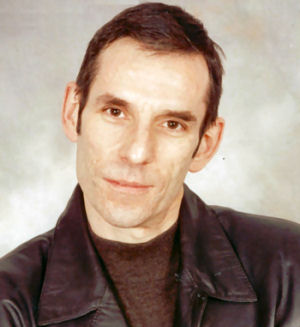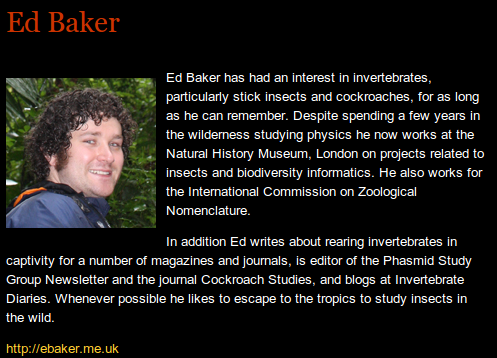Notes from my experience breeding and studying a wide variety of different invertebrates.
Showing posts with label pestival. Show all posts
Showing posts with label pestival. Show all posts
Saturday, 3 July 2010
Insect Week
I have blogged about my National Insect Week activities over at the Pestival blog: Insect Week by Ed Baker.
Monday, 31 May 2010
Pestival Blog
I was recently asked to blog on the Pestival website, an offer that I have accepted. But don't worry, Invertebrate Diaries will stay here, but in addition I will be blogging at ttp://pestival.org/blog/author/Ed%20Baker/.
Saturday, 6 February 2010
Pestival Party
Last night I had the unexpected pleasure of going to a party in Russel Square at the Horse Hospial to celebrate the screening of a film about last year's Pestival event.
Having missed the film due to other plans I spent some time talking (and drinking) with Amoret Whitaker and Tessa Farmer who were both there and also maybe hatching some plans for an art/science collaboration type-thing (how vague).
Saturday, 19 September 2009
Pestival: Insect Detectives
As soon as death occurs your body becomes a potential food source for various insects. Natural History Museum forensic scientists study the insects associated with decaying bodies to help solve crime.

 There was live adult blowflies on display and a display of other insects associated with decomposing bodies.
There was live adult blowflies on display and a display of other insects associated with decomposing bodies.

This was perhaps the best hands-on part of Pestival for children. Under a tent (which had actually be used previously on real crime scenes) a simulated crime scene, complete with fake dettached hands and blowfly larvae, was set up. Under the supervision of Amoret Whitaker and Martin Hall you could collect the larvae and identify them.
 There was live adult blowflies on display and a display of other insects associated with decomposing bodies.
There was live adult blowflies on display and a display of other insects associated with decomposing bodies.You can see more photos of Insect Detectives on my Flickr pages.
Labels:
amoret whitaker,
forensic,
martin hall,
Natural History Museum,
pestival
Thursday, 10 September 2009
Not-Doings (by Jane Wafer)
Human-sized butterfly chrysalises exhibited at the Royal Festival Hall as part of Pestival.
Pestival Symposium: How Insect Are We?
Thursday 3rd September, 2009 7:30PM
 I am always slightly suspicious about the boundary or art and science. It can be great, such as Fred Edwards' work on Alfred Russel Wallace or Tessa Farmer's The Horned Skullship (shown at the main Pestival event at the South Bank Centre - I will blog about this later ).
I am always slightly suspicious about the boundary or art and science. It can be great, such as Fred Edwards' work on Alfred Russel Wallace or Tessa Farmer's The Horned Skullship (shown at the main Pestival event at the South Bank Centre - I will blog about this later ).
 The first talk by Stanford University ant biologist Deborah Gordon (of Gordon Lab) was a good start. She covered some examples of ant behaviour (they're lazier than most people believe) and society structure (it's not much like ours). There is a great video of Deborah giving a TED talk here (parts of which are very close to her Pestival talk): Deborah Gordon digs ants.
The first talk by Stanford University ant biologist Deborah Gordon (of Gordon Lab) was a good start. She covered some examples of ant behaviour (they're lazier than most people believe) and society structure (it's not much like ours). There is a great video of Deborah giving a TED talk here (parts of which are very close to her Pestival talk): Deborah Gordon digs ants.
Deborah's conclusion was that we really aren't that much like ants.
 The second speaker, the very eloquent Steve Connor (Professor of Modern Literature and Theory at Birkbeck College, London), spoke about flies - 'The Times of Our Lives' - showing how they had made appearances in art and literature for centuries. Being an enlightened chap he has made the text of his talk (PDF) available here.
The second speaker, the very eloquent Steve Connor (Professor of Modern Literature and Theory at Birkbeck College, London), spoke about flies - 'The Times of Our Lives' - showing how they had made appearances in art and literature for centuries. Being an enlightened chap he has made the text of his talk (PDF) available here.
Steve did at one point come up with an amusing measure of how insect we are: we are genetically 98% identical to a chimpanzee and 40% the same as a banana, therefore we are between 40% and 98% insect.
 In the third talk Simon Laughlin (Professor of Neurobiology, Department of Zoology, University of Cambridge) showed how the neural networks in the eyes of flies used to identify roll during flight can be used a basis for studying the more complex networks present in humans.
In the third talk Simon Laughlin (Professor of Neurobiology, Department of Zoology, University of Cambridge) showed how the neural networks in the eyes of flies used to identify roll during flight can be used a basis for studying the more complex networks present in humans.
 Finally engineer and designer Natalie Jeremijenko spoke about some methods she uses to promote conservation in cities and also about her work on interfacing with insects in their own way (in the photo below a human is wrestling a large beetle - from the beetle wrestling page).
Finally engineer and designer Natalie Jeremijenko spoke about some methods she uses to promote conservation in cities and also about her work on interfacing with insects in their own way (in the photo below a human is wrestling a large beetle - from the beetle wrestling page).
You can read more about Natalie's projects here.

In conclusion there was no agreement about how insect we are. In fact this issue was only really skimmed over by the speakers - but that's for the best as the question is actually pretty useless. What is good is that it bought some people together, who had a good time. The best answer heard all evening was essentially that we are half a billion years different from insects.
 I am always slightly suspicious about the boundary or art and science. It can be great, such as Fred Edwards' work on Alfred Russel Wallace or Tessa Farmer's The Horned Skullship (shown at the main Pestival event at the South Bank Centre - I will blog about this later ).
I am always slightly suspicious about the boundary or art and science. It can be great, such as Fred Edwards' work on Alfred Russel Wallace or Tessa Farmer's The Horned Skullship (shown at the main Pestival event at the South Bank Centre - I will blog about this later ).The Pestival programme is meant to look at "insects in art and he art of being an insect". In other words it tries to use insects to bridge science and art (and achieves this to a greater or lesser extent). The Pestival Symposium was perhaps the main science-focussed event (introduced by New Scientist editor Roger Highfield), and was held at the Meeting Rooms of the Zoological Society of London.
 The first talk by Stanford University ant biologist Deborah Gordon (of Gordon Lab) was a good start. She covered some examples of ant behaviour (they're lazier than most people believe) and society structure (it's not much like ours). There is a great video of Deborah giving a TED talk here (parts of which are very close to her Pestival talk): Deborah Gordon digs ants.
The first talk by Stanford University ant biologist Deborah Gordon (of Gordon Lab) was a good start. She covered some examples of ant behaviour (they're lazier than most people believe) and society structure (it's not much like ours). There is a great video of Deborah giving a TED talk here (parts of which are very close to her Pestival talk): Deborah Gordon digs ants.Deborah's conclusion was that we really aren't that much like ants.
 The second speaker, the very eloquent Steve Connor (Professor of Modern Literature and Theory at Birkbeck College, London), spoke about flies - 'The Times of Our Lives' - showing how they had made appearances in art and literature for centuries. Being an enlightened chap he has made the text of his talk (PDF) available here.
The second speaker, the very eloquent Steve Connor (Professor of Modern Literature and Theory at Birkbeck College, London), spoke about flies - 'The Times of Our Lives' - showing how they had made appearances in art and literature for centuries. Being an enlightened chap he has made the text of his talk (PDF) available here.Steve did at one point come up with an amusing measure of how insect we are: we are genetically 98% identical to a chimpanzee and 40% the same as a banana, therefore we are between 40% and 98% insect.
 In the third talk Simon Laughlin (Professor of Neurobiology, Department of Zoology, University of Cambridge) showed how the neural networks in the eyes of flies used to identify roll during flight can be used a basis for studying the more complex networks present in humans.
In the third talk Simon Laughlin (Professor of Neurobiology, Department of Zoology, University of Cambridge) showed how the neural networks in the eyes of flies used to identify roll during flight can be used a basis for studying the more complex networks present in humans. Finally engineer and designer Natalie Jeremijenko spoke about some methods she uses to promote conservation in cities and also about her work on interfacing with insects in their own way (in the photo below a human is wrestling a large beetle - from the beetle wrestling page).
Finally engineer and designer Natalie Jeremijenko spoke about some methods she uses to promote conservation in cities and also about her work on interfacing with insects in their own way (in the photo below a human is wrestling a large beetle - from the beetle wrestling page).You can read more about Natalie's projects here.

In conclusion there was no agreement about how insect we are. In fact this issue was only really skimmed over by the speakers - but that's for the best as the question is actually pretty useless. What is good is that it bought some people together, who had a good time. The best answer heard all evening was essentially that we are half a billion years different from insects.
Subscribe to:
Posts (Atom)
ShareThis
Copyright Ed Baker

